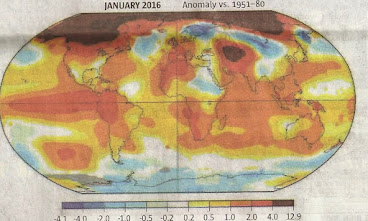
Once again, almost like clock work, the "dummy brigade" has emerged (mainly on FOX, Limbaugh) to dismiss the bitter sub-zero temperatures sending the mid-western U.S. into a deep freeze as part of a "natural cycle". Thereby arguing there's really no global warming, no climate change and hey,just bundle up more for the polar vortex. It's all a "hoax"according to these nitwits.
A recent example of the latter was a letter in the local press (COS Indy, Jan. 2-8, p. 4 ) by a Mark Rozman who claimed:
“Climate change is a
natural, ongoing process as evidenced by tree ring data” etc.
But there is more than tree ring data to be factored in here. While tree ring data is a useful proxy indicator, it still doesn’t come
close to ice core analysis in ascertaining the increasing concentration of CO2
and its effect on climate. In ice core analysis the air trapped in
cylindrical ice cores (extracted from deep within the Earth) is
chemically assayed . The gases are
analyzed to quantify the CO2 concentration, then related to the
climate at the time.
One of the most prolific ice core researchers - who originally discovered (ca. 1986) that the Arctic was warming much more than the continental U.S. - was Prof. Gunther Weller of the Geophysical Institute, University of Alaska- Fairbanks :
Prof. Gunther Weller (1987)
His work and that of others has disclosed that over the past 800,000 years the CO2
concentration of 300 ppm was never crossed until after
the advent of the Industrial
Revolution and the burning of fossil fuels.
Further, it has been found that no Ice ages have occurred whenever the
CO2 concentration exceeded 200 ppm. This
means that climate change cannot be a “natural ongoing process.´ How can it
when the greatest spike in CO2 concentration (now approaching 410 ppm) occurred
after the human-instigated Industrial Revolution?
In terms of tree rings, the relevant indicator is the ratio of the
C14 isotope to the C12 isotope, as disclosed by solar physicist John Eddy.
Eddy showed (‘The New Solar Physics’; p. 17, 1978) that an anthropogenic effect
could be deduced from a graph of C14:C 12 deviations over a long enough period,
i.e. 2,000 years.
Specifically, “the sharp upward spike at the modern end of
the curve is attributed to anthropogenic
causes and is the mark of increased population and the industrial age.”
(Op. cit.)
Eddy’s work in concert with
many others, shows clearly humans are the primary agents driving climate
change. Remove the human influence from the past 250 years or so and we are not
approaching 410 ppm of CO2 concentration. Not even close!
This Arctic heat emphasis, for example, was exposed in the January , 2016 zonal temperature map :
The finding dovetailed with Prof. Gunther Weller's predictions (from the mid -1980s) - based on his ice core analyses- that future warming would be greatest in the Arctic. This is a phenomenon known as "Arctic amplification". In papers and seminars delivered at the GI over 1985-1990 he pointed out that a much warmer Arctic also means a much more unstable polar region with more frequent intrusions ("waves") of the polar vortex, leading to frigid temperatures in parts of the U.S. such as we've seen the past few years. In one seminar he described it "almost like moving the Arctic to the continental U.S."
Unpacking it further: there is generally an immense cold mass of air that sits over the Arctic. Because of global warming, climate change the Arctic has experienced diminished sea ice, E.G.

As the sea ice mass melts there is less reflection of radiation into space and hence more rapid warming of the surface. This diminished sea ice then results in more heat dispatched into the atmosphere. This in turn destabilizes the polar vortex - a low pressure area normally residing over the north pole. This instability then allows polar air to plunge southward into the continental U.S. .
The details leading to what we've seen the past several days (with temperatures in some locations even rivaling those in Antarctica) occurred on January 2nd. NOAA monitors showed that part of the stratosphere had a rapid rise of 50 degrees F in just a few days. The event split the unstable polar vortex, so that part broke off. Afterward, pockets of Arctic air migrated south causing the current deep freeze.
Let's also process that the warming onslaught is exacerbated by the rapid melting of permafrost. Vast expanses of former Arctic permafrost have been reduced to mud, and also in the process of warming released methane - perhaps the Greenhouse gas which is most potent. See e.g.
http://brane-space.blogspot.com/2017/03/more-rapid-permafrost-melting-triggers.html
As reported by the University of Alaska -Fairbanks Arctic Research site:
In 2016, the latest year of complete records, the majority of Arctic observation sites reported the highest permafrost temperatures on record.
The takeaway is that these sub-zero super freezes we're seeing with polar vortex intrusions are likely to become more frequent in the future, not less. The deniers and climate dummies would do well to learn more about this phenomenon and why they should be fearful, not wise ass snarky, to play into the agnotology narrative. See e.g.



No comments:
Post a Comment